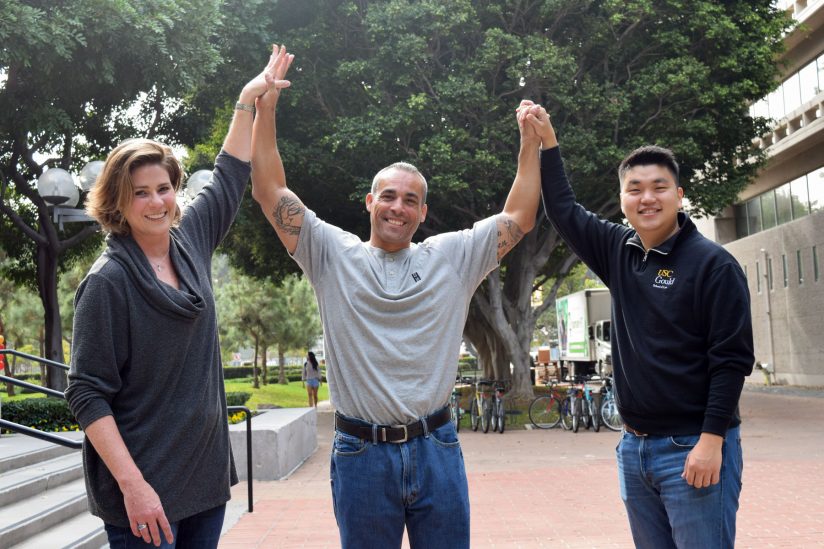USC’s Post-Conviction Justice Project is giving juvenile offenders a second chance
Law professor Heidi Rummel points to a piece of art she keeps on the wall in her office. It’s a painting by one of her clients, Ruben Ruiz, a former convict. Ruiz was released from prison five months ago — thanks to the help of USC’s Post-Conviction Justice Project that Rummel co-directs. Ruiz had been in prison for 26 years, 12 of which were spent in solitary confinement after he was charged with a “special circumstance” murder at 17.
“I had the idea that I was going to die in prison,” Ruiz said. “I was moved by the fact they were willing to help. I had never had anybody that I didn’t know come into my life and do something for me, let alone fight for my freedom.”
Ruiz said he owes a lot to Rummel and calls her a great friend.
“There [are] some people that you come across in life that you just want to get to know and she’s certainly that person for me,” Ruiz said. “Whenever we talk, I always walk away with a greater perspective.”
Years before she met Ruiz, Rummel served as a criminal prosecutor from 1996 to 2005, working to seek justice for victims and put criminals behind bars. In 2006, the director of the Post-Conviction Project invited her to join the program. Initially, Rummel was unsure, but she was open to see how she felt. It didn’t take long before she realized she was right at home. Her passion would inevitably emerge for her clients, their cases and the reforms she brought to the system.
“Even though I’m fighting on the other side of the table, I do feel like I’m fighting for fairness and justice in the process, for people who are left behind and for a process that was patently unfair,” Rummel said.
Today, she is the co-director of a 30-year program at the Gould School of Law which gives juveniles and female convicts who are sentenced to life without parole a chance at resentencing. It also serves as a learning experience for law students by providing them with opportunities to work on real cases.
“When students come to me, they have a foundation in the law,” Rummel said. “They understand how to read a case, how to make a legal argument, how to analyze the law and they move from that foundation into being true advocates for their clients.”
For Rummel, at every stage of her career, she is moved to fight for justice. She has fought for civil rights, hate crime and police misconduct cases, all while working as a federal prosecutor in the United States attorney’s office.
Rummel said she recognized gaps in the criminal justice system and worked to improve the landscape through legislative reform.
“I really feel passionate about fighting for people who don’t have anyone fighting for them and haven’t had their rights protected by the system,” she said.
Jihyuk Song, a third-year law student, worked on Ruiz’s case with Rummel. Now, Song travels to prisons across California with Ruiz and speaks to juvenile convicts about their experiences and goals of rehabilitation.
“Just four months ago I was visiting [Ruiz] in prison,” Song said. “Now he’s visiting prisons with me and able to help, and seeing that is great.”
Ruiz is the project’s most recent client to be released from prison early. He said that spending time in solitary confinement allowed him to reflect on his life. These reflections influenced him to adopt Eastern meditation techniques and become an avid reader. He was also able to earn two college degrees behind bars.
“I was able to transform my life and become the person I am today because of that time that I spent in [solitary confinement],” Ruiz said. “It humbled me, and it changed my life.”
After spending more than two decades in prison, Ruiz said he is still adjusting to life as a free man. He looks forward to spending time with his family, helping his mother manage her business and working with the project that helped set him free.
“Just seeing how [Rummel] impacts so many lives, her dedication and commitment, I have definitely grown to really enjoy the experience that she’s introduced me to,” Ruiz said. “I want to keep paying it forward.”
And Rummel, she said she isn’t going to stop helping people like Ruiz. Her goals are to continue improving the criminal justice system, and fighting for her clients.
“I think we’re moving from a system where you are defined by your crime and nothing else,” Rummel said. “We’re starting to look at the human being, at what is right for you, what you deserve, what will punish you and heal you, and I really hope we continue to move in that direction.”


